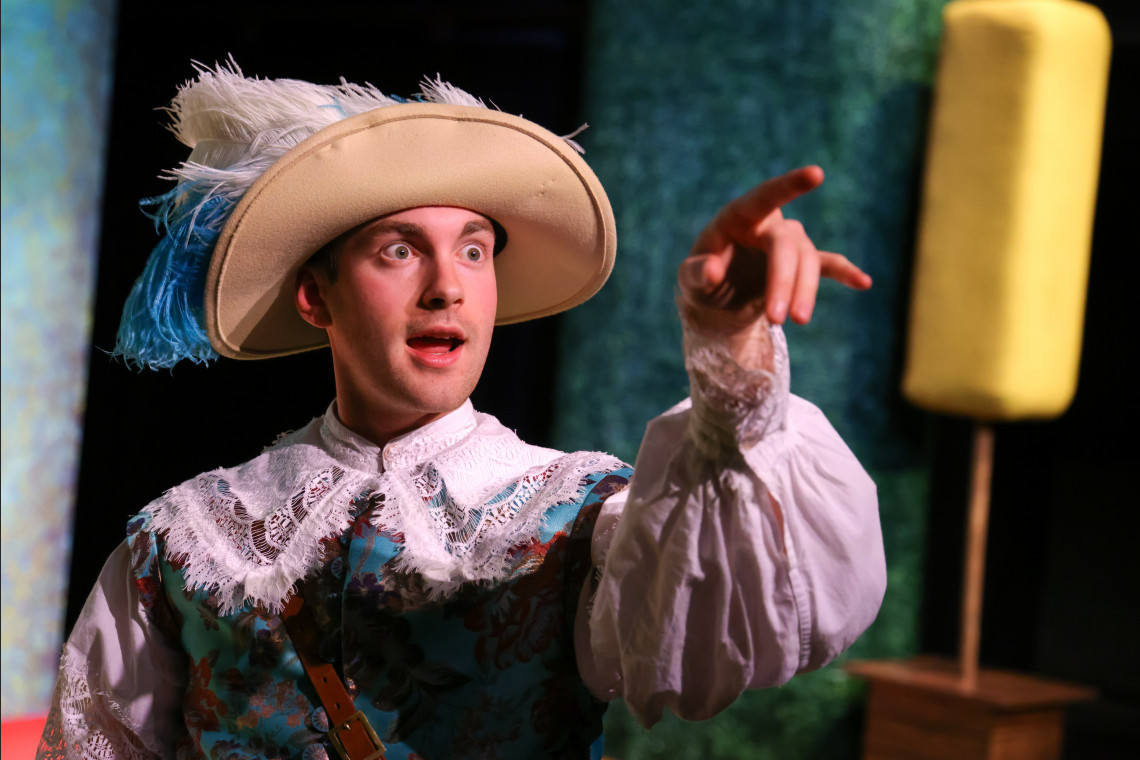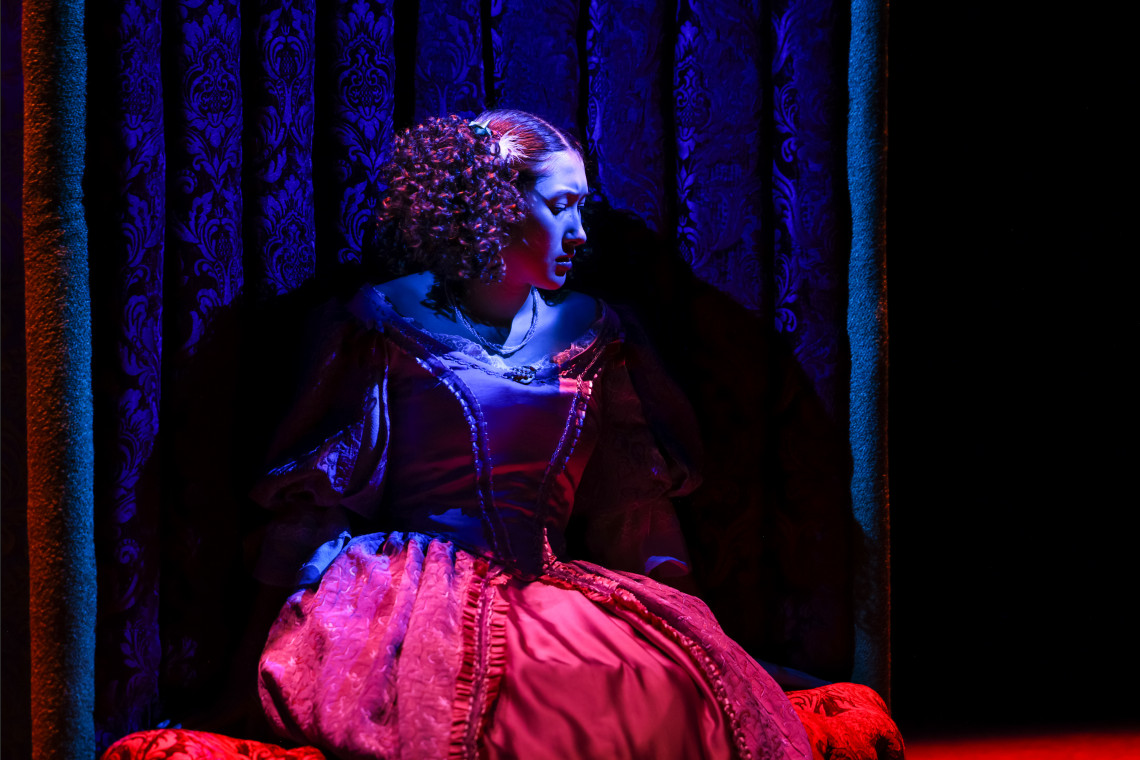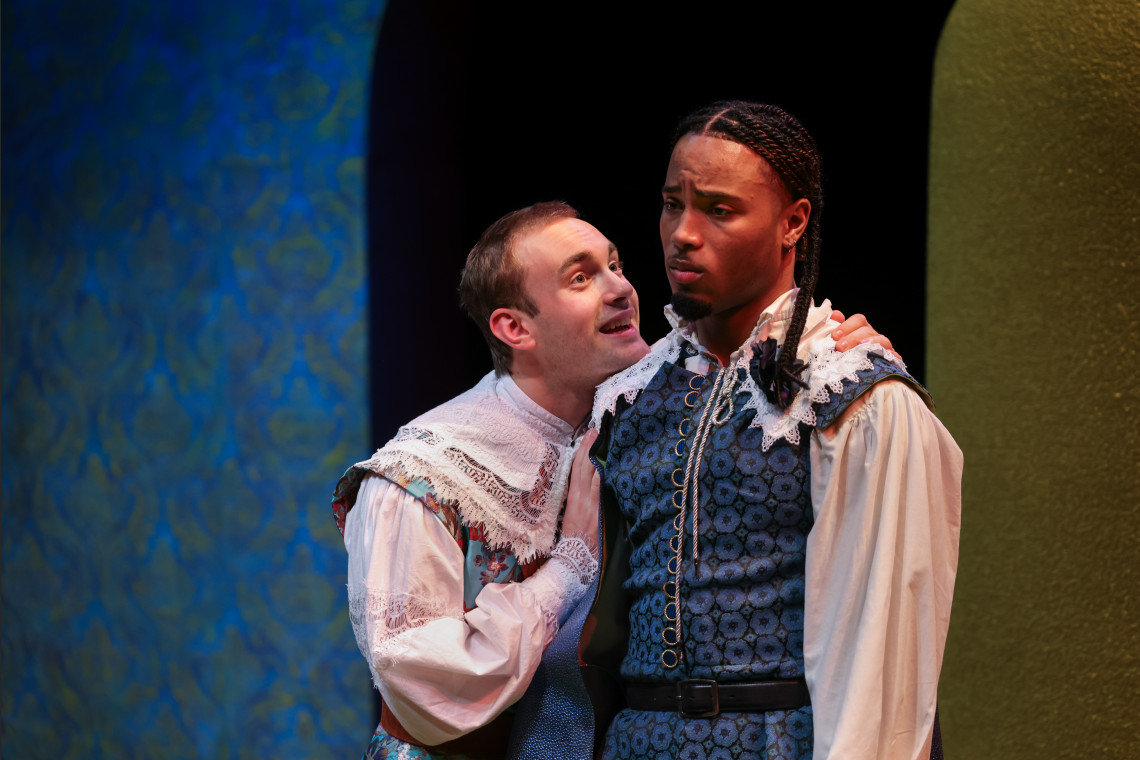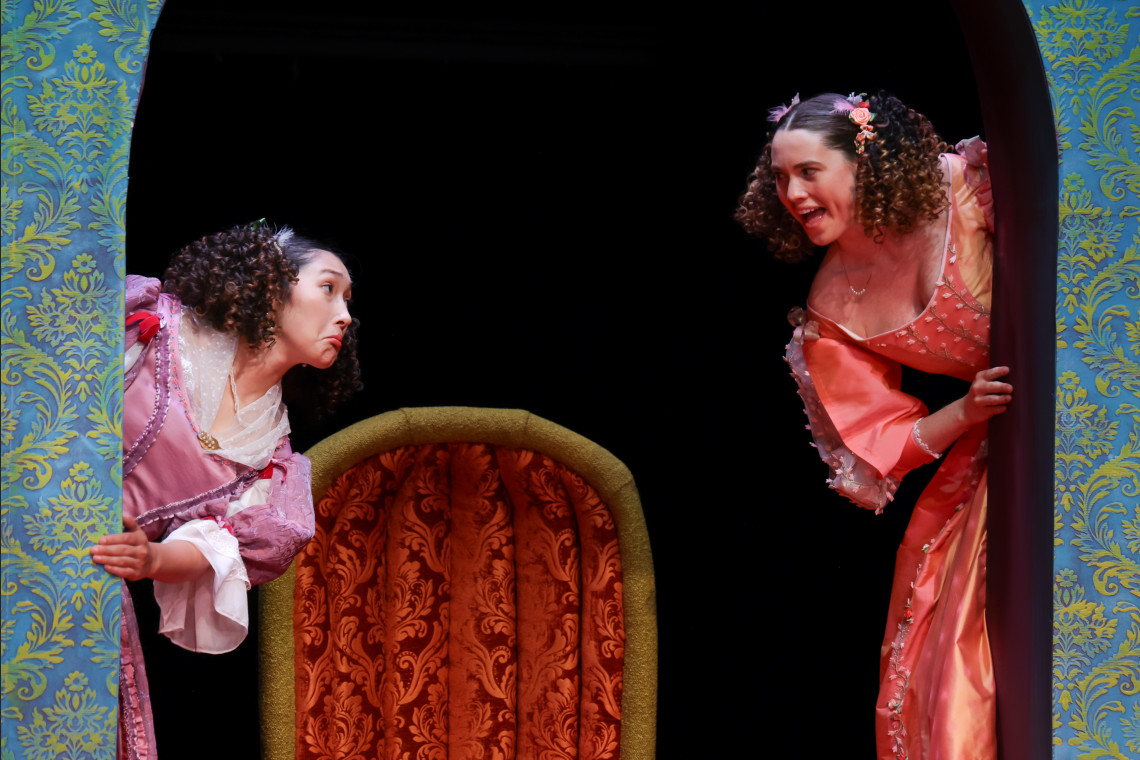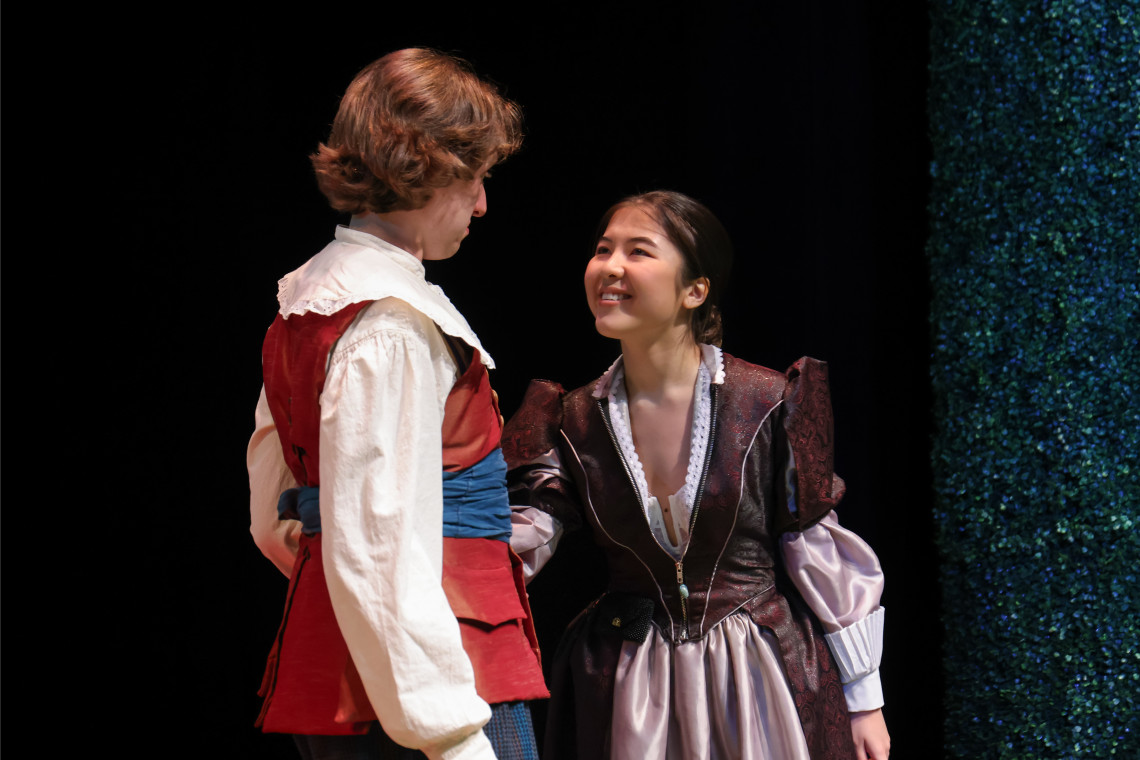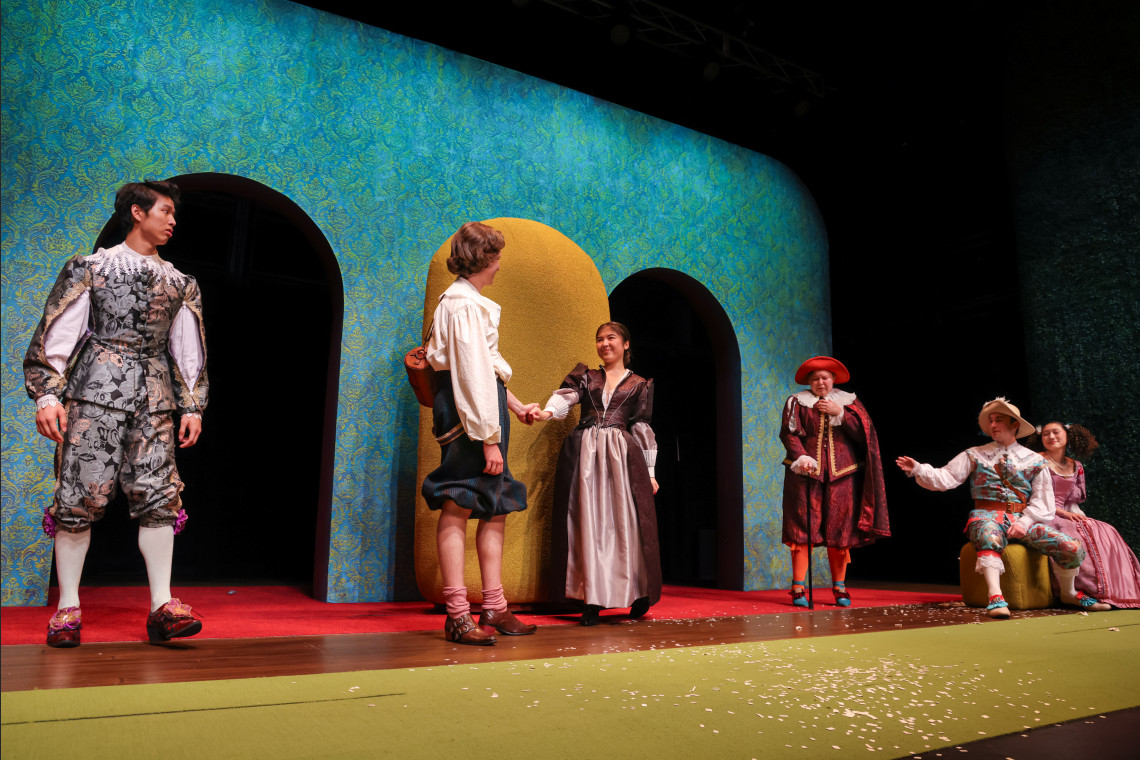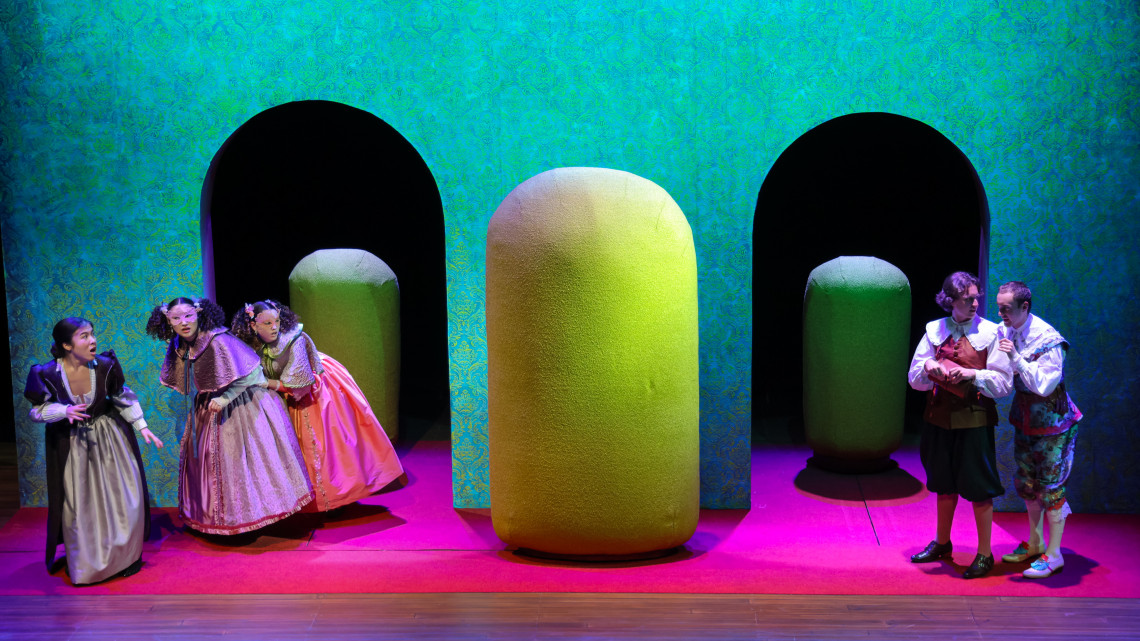
"The Liar” Showcases the Joy of Theatrical Make-Believe
When is a lie acceptable, perhaps even a catalyst for creativity?
This is a central question in Pierre Corneille’s “The Liar,” and it remains as thought-provoking today as it was at the play’s premiere in 1644.
Directed by Darren Gobert, Duke Theater Studies’ Mainstage production of David Ives’ adaptation of the comedic masterpiece is impish, full of physical humor and surprisingly relevant. It follows the romantic misadventures of Dorante, a young man with a penchant for creative invention, and his servant, Cliton, who is unable to lie.
Gobert, chair of the department and professor of Theater Studies, had to come to terms with the moral ambiguity “The Liar” offers. “What is posited as ‘lying’ in the play is actually theatrical make-believe,” he said. “Rather than being an apology for mendacity, it's an exploration of how a community of people on stage and in the audience can collectively imagine something to be real when they know it's not.”
A specialist in 17th century French theater, Gobert places “The Liar” within the larger cultural conversation about secularism and religious belief taking place in Western Europe at that time.
“There was a lot of anti-theatrical prejudice in Paris,” Gobert said. “There were theological concerns about actors pretending to be other people and pretending to do things that were not actually happening. Corneille mounted an impassioned defense of the theater. He understood the kind of lying that happens on stage when a person pretends to be someone they're not is very different from lying in real life.”
The 1650s and 1660s were a thrilling period for French theater, not just because of cultural forces in collision, but also the introduction of new technologies that revolutionized stagecraft.
“Today, what we see onstage at any given moment represents a specific place, like a classroom or a garden,” Gobert said, “but that's actually a very modern understanding.” Prior to the 1650s, the stage in Western Europe was still viewed very much as it had been in the Middle Ages. “It was a universal space, one set that contained everything that needed to be represented for the entirety of the play, all squashed together in one place.”
In the 1650s and 1660s, theaters in Paris were renovated — or even demolished and rebuilt — to add state-of-the-art stage technology. “Technological advances meant you could actually fly in scenery from above or move in scenery from offstage with pulleys and winches,” Gobert said. “Using this new staging technology became kind of an obsession, and playwrights began to write plays that would change scenes frequently to showcase these capabilities.”
“The Liar,” written in the mid-1640s, appeared on the cusp of these innovations. Gobert reached out to scenic designer Torry Bend, professor of the practice of Theater Studies, and the department’s new faculty member in design technology, Bill Webb, to incorporate elements of 17th century stage technology.
“In our production, the stage is one space with carpeting and trees, hedges and walls shifting very minimally as scenery is pulled in and out using winches built specifically for this play,” Gobert said. “Bill buried all these tracks and technology under a stage that's just a couple of inches high. It's quite a feat of engineering, and we've never undertaken something like this in a Theater Studies production before.”
Previously, outside experts had to provide much of the technical support for productions. Having new faculty colleagues with this expertise — like Webb and sound designer Ethan Eldred, who joined Theater Studies this year — allows the department to invest in more complex projects and provide students with robust hands-on learning experiences.
Webb, who is teaching World Building for the Theater, involved students throughout the process of building winches, pulleys and tracks for “The Liar.”
“They assisted with fabrication of all scenic elements, even taking on some of the problem-solving aspects of construction,” he said. “Being exposed to this high level of complexity in the creative arts has been eye opening for them.”
“The vision behind hiring the design faculty we’ve added in the last couple of years is that we can teach design and technology in the curriculum in ways that are really fitted into the Mainstage productions, instead of the productions sitting apart from the curriculum,” said Gobert.
The emphasis on Theater Studies’ productions as spaces for teaching is evident in the department’s open philosophy about selecting a show’s cast and crew, which includes students from all four years at Duke, both majoring in theater and interested in theater, as well as those who've never taken a theater class.
Blaze Gambla — a senior majoring in Theater Studies who portrays Dorante — is a veteran of five Mainstage productions. “The Liar” is his last before graduation and he reflected that, while very different, each production has been uniquely enjoyable and educational. “I've learned that theater's canvas is far broader than I had thought possible,” he said.
Larrabee Ellenberg — who plays the role of Geronte, Dorante’s father — is experiencing her first Mainstage production. “Coming to Duke, I wanted to step outside of my comfort zone,” she said. “I was a little shocked and nervous to be in a comedy as off-the-wall and fast-paced as ‘The Liar,’ but it's been wonderful to get to know some of the upperclassmen and I've become a lot more comfortable. A big part of the process has been shaking off that nervousness and just letting myself have fun with it.”
Fun — the pure, uncomplicated joy of participating in theatrical make-believe, whether on stage or in the audience — is what Corneille advocated almost 400 years ago. Gobert’s hopes this production of “The Liar” will relay those intentions across the dividing centuries.
“I would like everybody to laugh for two hours straight when they come to the show,” he said. “That would be my goal.”
The Liar
By David Ives
Adapted from the comedy by Pierre Corneille
Directed by Darren Gobert
April 3 - 5 & 10 - 12 at 8PM
April 6 at 2PM
Von der Heyden Theater, Rubenstein Arts Center
https://tickets.duke.edu


